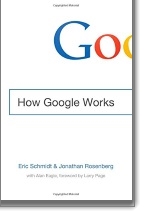Book Review: How Google Works
 Schmidt, Eric and Jonathan Rosenberg. How Google Works. Grand Central Publishing, 2014.
Schmidt, Eric and Jonathan Rosenberg. How Google Works. Grand Central Publishing, 2014.
In 2014 Google captured the #3 spot on Fortune’s list of most admired companies worldwide. The previous year, Google was ranked #2 but somehow the company dropped a position, overtaken by Amazon.com, a company despised for its shabby treatment of employees and predatory business practices. How this happened to a company with a “Don’t be evil” mantra is a mystery.
Google itself has been somewhat of a mystery, but in recent years, several books have been published that illuminate the practices of the company and the principles of its founders. A new book by former CEO Eric Schmidt and former VP for products Jonathan Rosenberg, How Google Works, provides a guarded look at the company as they dispense Google-style ideas and tools to managers on how to create a company where revenues grow exponentially and a work environment where employees thrive.
Schmidt and Rosenberg both began at Google in 2001-2002 when the start-up was three years old. Their book covers the early years at Google and discusses the launch of many of its popular products. Today both authors remain connected with the company. Eric Schmidt is executive chairman and Jonathan Rosenberg is an advisor to Google CEO and co-founder Larry Page.
Many stories in How Google Works are engaging, especially those about the authors’ personal experiences with founders Larry Page and Sergey Brin and other industry icons like Steve Jobs. Also interesting are discussions of Google’s operating principles and corporate culture, especially ideas that run contrary to accepted business thinking. For example, the chapter on strategy introduces the concept of “technical insights,” the standard for Google’s most successful products. The authors advise managers to create product plans with technical insights rather than to analyze the company’s competitive advantage as taught in MBA Strategy courses.
Yet the writing in this 250+ page book is uneven and could have been improved by more careful editing. Some the topics are obvious, “Firing sucks,” for example; Be clear in your email; Say “yes” to employees. The list of Google’s Hiring Dos and Don’ts includes this advice: “Hire people who get things done” and “Don’t hire people who are political or manipulative.” With tighter editing, readers would not miss the weakest 50 pages and the book would be better overall. Despite its faults, this book is recommended for anyone interested in working at Google or reading about technology companies.
Also available in Kindle, Overdrive eBook, Overdrive Audiobook, and Audio CD formats.
© Meg Trauner & Ford Library – Fuqua School of Business.
All rights reserved.